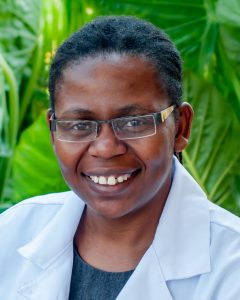 Q: What attracted you to the field of pathology?
Q: What attracted you to the field of pathology?
A: The need for more pathologists in Malawi. When I was a medical student 1999-2003, there were only two pathologists in Malawi and I saw how they struggled to keep pathology services growing in the country. One day when I was in my third year, I observed an autopsy, and it was amazing to see the cause of death as a pulmonary embolism complicating deep vein thrombosis in a sudden death of an adult male. This made my interest grow and I discovered pathology provided answers.
Q: As the first female pathologist in Malawi, do you feel you are a role model for women and girls who also want to pursue a career in laboratory medicine?
A: Yes, I am the first female pathologist. Yes, I am a role model to women and girls. I have been featured in our local weekend papers several times to tell my story. I have stimulated interest in female medical students and young doctors to consider pathology as a career. In 2017, we had our second female pathologist Dr. Yambaso Manda. In addition, I have been invited to talk to girls in school to motivate and encourage them. In my local church, I am a patron of a youth group that comprises high school going boys and girls. They like me a lot and are always eager to learn from me.
Q: What are your clinical duties at UNC Project-Malawi?
A: My duties include:
• providing diagnostic pathology service to Kamuzu Central Hospital, a teaching hospital in Lilongwe, which is the capital of Malawi. The lab serves half the population of Malawi, or around 8 million people.
• providing pathology support to cancer research projects here at UNC Project-Malawi. I am involved in cervical, lymphoma, esophageal, breast and Kaposi sarcoma research projects. We also support NIH-funded network studies.
• leadership for the pathology laboratory together with Lab Manager Rob Krysiak.
Q: Is there a research question you hope to answer during your career?
A: I am a young researcher and I am developing my academic career in breast cancer. I would like to characterize the immunophenotype and molecular characteristics of breast cancers in Malawi and find out their associations with age, stage of disease, tumor grade and breast risk factors.
Q: Do you also teach at the College of Medicine?
A: Yes, I also teach pathology to undergraduates at the University of Malawi College of Medicine, where I am also appointed as faculty.
Q: Do you train people in the lab at UNC Project-Malawi?
A: Yes, we train people in our lab. Currently, we train undergraduate medical laboratory sciences/biomedical sciences students from the College of Medicine and other public and private health training institutions in Malawi. They do rotations in our lab.
Q: What do you enjoy the most about your job?
A: The fact that we diagnose patients’ diseases, especially cancer, which informs appropriate treatment. Without tissue diagnosis, a cancer cannot be treated. Without tissue diagnosis, a patient can be erroneously treated for cancer for a swelling that clinically mimics cancer, and hence, subjected to unnecessary harmful effects of chemotherapy. In addition, by being involved in research, we are providing answers to some health problems in Malawi.
Q: When you are not working, what do you like to do for fun?
A: I like outdoor activities such as running and hiking. I also enjoy traveling and discovering new places.
Q: Any final thoughts?
A: I would like to acknowledge our team in the Malawi Cancer Consortium led by Dr. Satish Gopal. They are very amazing people – always eager to work together and help.